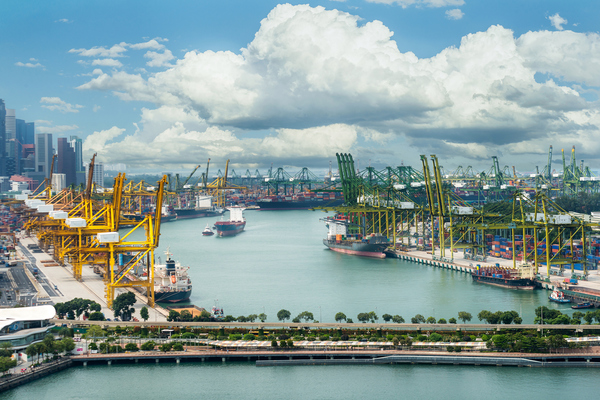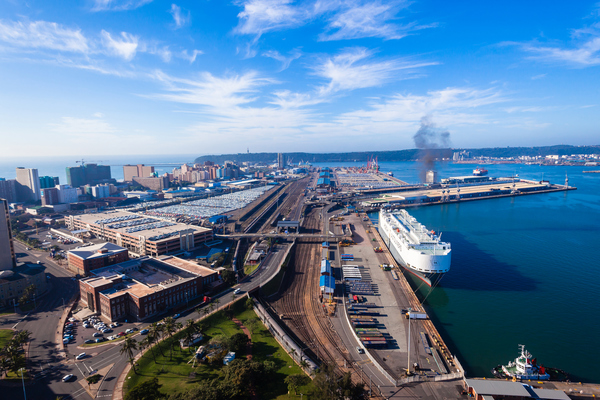Europe & Africa Market Update 12 Apr 2024
Bunker benchmarks in European and African ports have declined with Brent, and prompt LSMGO availability is good in the ARA hub.
 PHOTO: View of the Port of Amsterdam. Getty Images
PHOTO: View of the Port of Amsterdam. Getty Images
Changes on the day, to 09.00 GMT today:
- VLSFO prices down in Durban ($4/mt), Rotterdam and Gibraltar ($1/mt)
- LSMGO prices down in Durban ($70/mt), Rotterdam ($15/mt) and Gibraltar ($1/mt)
- HSFO prices up in Gibraltar ($3/mt), and down in Rotterdam ($8/mt)
Gibraltar’s HSFO price has moved counter to the wider market direction and increased some in the past day, whereas the port’s VLSFO price has shed slightly. These price moves have narrowed the port’s Hi5 spread by $4/mt to $106/mt now.
Strong wind gusts of up to 32 knots are forecast to hit Gibraltar in periods between today and Sunday. This could hamper smooth bunker deliveries there. Two vessels are currently waiting to receive bunkers in Gibraltar, according to a source. Bunker operations are running normally in the nearby Ceuta port, with seven vessels due to arrive for bunkers today, says shipping agent Jose Salama & Co.
Rotterdam’s LSMGO price has fallen significantly in the past day compared to Gibraltar’s modest LSMGO price dip. This has widened Rotterdam’s LSMGO discount to Gibraltar by $14/mt to $74/mt now.
Prompt LSMGO supply is good in the ARA hub with a trader recommending 2-4 days for the grade. A lower-priced prompt LSMGO stem fixed in Amsterdam at $797/mt has added downward pressure on the port’s benchmark. Amsterdam’s LSMGO price has decreased by $7/mt to $797/mt now.
Brent
The front-month ICE Brent contract inched $0.27/bbl lower on the day, to trade at $90.53/bbl at 09.00 GMT.
Upward pressure:
Brent has remained at elevated levels this week on the back of escalating geopolitical conflicts that have sparked concerns over supply disruption in major oil-producing regions of the world.
Earlier this week, Iran announced retaliation for recent Israeli attacks on the Iranian consulate in Syria. Iran has also threatened to restrict access to the Strait of Hormuz, a vital chokepoint for global oil transit.
Around 20% of global oil supplies transit through the strait on an average daily basis, according to the US Energy Information Administration (EIA). Any further attacks on commercial shipping in the region can push Brent’s price higher, according to analysts.
The US has issued a warning for its citizens in Israel and asked them not to travel outside greater Tel Aviv, Jerusalem, and Be'er Sheva, amid heightened regional threats.
“[Brent] oil prices remained elevated, hovering near 2024 highs, fueled in part by geopolitical tensions after the US issued warnings of a potential attack by Iran on Israeli assets,” SPI Asset Management’s managing partner Stephen Innes said.
Downward pressure:
Brent futures edged lower, reflecting the market’s concerns over subdued oil demand in the US amid expectations of a delay in interest rate cut.
The US consumer price inflation strengthened in March, according to the latest Consumer Price Index (CPI) data. Inflation rose by a stronger-than-expected 3.5% in March, according to the US Bureau of Labor Statistics.
Higher consumer price inflation in the US could lead the Federal Reserve (Fed) to delay rate cuts, which could further dampen oil demand.
“Persistent inflationary pressures, particularly in the service sector, have led investors to revise their expectations, now anticipating that the Federal Reserve may delay interest rate cuts until the year's fourth quarter,” Innes added.
By Manjula Nair and Aparupa Mazumder
Please get in touch with comments or additional info to news@engine.online

Contact our Experts
With 50+ traders in 12 offices around the world, our team is available 24/7 to support you in your energy procurement needs.




